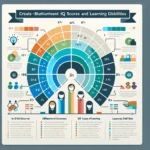Understanding the Relationship Between IQ Scores and Learning Disabilities
Learning disabilities are a topic of much discussion in the educational sphere, as they have a profound effect on a person’s ability to acquire knowledge and skills in the same way as their peers. When exploring the intricacies of learning disabilities, one significant aspect that comes into play is the concept of Intelligence Quotient, or IQ. IQ scores have often been a point of interest for educators and psychologists alike when analyzing the learning capabilities of individuals. In this article, we’ll delve into the relationship between IQ scores and learning disabilities, offering a comprehensive perspective on this complex subject.
Firstly, it is vital to understand what an IQ score represents. It measures a range of cognitive abilities, including logical reasoning, problem-solving, and the capacity to understand complex ideas. While a higher IQ score generally indicates a stronger cognitive facet, it is not the sole indicator of an individual’s intellectual potential or their ability to learn. That’s where learning disabilities come into the picture.
Learning disabilities are neurologically-based processing problems which can hinder learning basic skills such as reading, writing, or math. They can also affect more complex skills such as organization, time planning, abstract reasoning, long or short-term memory and attention. These challenges are inherently individual and may occur in varying degrees.
When considering how IQ scores relate to learning disabilities, it’s essential to note that learning disabilities are not synonymous with low intelligence. In fact, a person with a learning disability can have an average or even above-average IQ. Conditions such as Dyslexia, Attention Deficit Hyperactivity Disorder (ADHD), and Dyscalculia, to name a few, do not discriminate based on intelligence. They are separate from cognitive ability, although they can impact performance on IQ tests, often making it difficult for those with learning disabilities to fully demonstrate their intellectual capacities through standardized IQ measurement.
An important point to consider is that a discrepancy between a person’s IQ score and their academic performance is often one of the indicators used by professionals to diagnose certain learning disabilities. For instance, if a child has a high IQ score but is performing significantly below what would be expected at their age and educational level, this disparity could suggest the presence of a learning disability. The child’s intelligence is not in question, but rather it points to an issue with how they process and apply information.
Moreover, when assessing a person with a learning disability, it’s crucial to factor in that traditional IQ tests may not always provide a complete picture of an individual’s learning ability. These tests might not accommodate for the specific challenges posed by a learning disability, consequently affecting the test results. Therefore, specialists often employ additional assessment tools that are tailored to recognize the strengths and weaknesses in learning associated with different disabilities.
Understanding the correlation between IQ scores and learning disabilities is fundamental for developing the appropriate educational strategies. Educational interventions, accommodations, and personalized learning plans can be designed to align with a person’s unique learning requirements, regardless of their IQ level.
In conclusion, while IQ scores offer some insights into an individual’s cognitive abilities, its relationship with learning disabilities is nuanced. IQ scores and learning disabilities intersect in complex ways, with each not directly determining the other. Due to the diversity of learning disabilities and the subjective nature of intelligence measurement, it’s crucial to evaluate each case on its own merits. A more inclusive approach in the assessment and an educational strategy that caters to various forms of intelligence and learning styles are paramount for providing the most conducive learning environment for individuals with learning disabilities. Through such personalized attention, students can achieve their full potential without being limited by their IQ score or learning disabilities.

